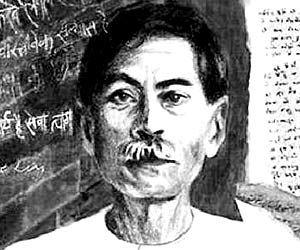Here is a brief biography and history of Premchand.
Read information on life of Indian writer Munshi Premchand.
Premchand Biography

Born: July 31, 1880
Died: October 8, 1936.
Achievements: Premchand brought realism to Hindi literature.
Premchand wrote on the realistic issues of the day-communalism,
corruption, zamindari, debt, poverty, colonialism etc. He avoided the
use of highly Sanskritized Hindi and instead used the dialect of the
common people.
Premchand popularly known as Munshi Premchand was one of the greatest
literary figures of modern Hindi literature. His stories vividly
portrayed the social scenario of those times.
Premchand's real name was Dhanpat Rai Srivastava. He was born on July
31, 1880 in Lamahi near Varanasi where his father Munshi Azaayab Lal was
a clerk in the post office. Premchand lost his mother when he was just
seven years old. His father married again. Premchand was very close to
his elder sister. His early education was in a madarasa under a Maulavi,
where he learnt Urdu. When he was studying in the ninth class he was married,
much against his wishes. He was only fifteen years old at that time.
Premchand lost his father when he was sixteen years old. Premchand was
left responsible for his stepmother and stepsiblings. He earned five rupees
a month tutoring a lawyer's child. Premchand passed his matriculation
exam with great effort and took up a teaching position, with a monthly
salary of eighteen rupees. While working, he studied privately and passed
his Intermediate and B. A. examinations. Later, Premchand worked as the
deputy sub-inspector of schools in what was then the United Provinces.
In 1910, he was hauled up by the District Magistrate in Jamirpur for
his anthology of short stories Soz-e-Watan (Dirge of the Nation), which
was labelled seditious. His book Soz-e-Watan was banned by the then
British government, which burnt all of the copies. Initially Premchand
wrote in Urdu under the name of Nawabrai. However, when his novel
Soz-e-Watan was confiscated by the British, he started writing under the
pseudonym Premchand.
Before Premchand, Hindi literature consisted mainly of fantasy or
religious works. Premchand brought realism to Hindi literature. He wrote
over 300 stories, a dozen novels and two plays. The stories have been
compiled and published as Maansarovar. His famous creations are: Panch
Parameshvar, Idgah, Shatranj Ke Khiladi, Poos Ki Raat, Bade Ghar Ki
Beti, Kafan, Udhar Ki Ghadi, Namak Ka Daroga, Gaban, Godaan, and
Nirmala.
Premchand was a great social reformer; he married a child widow named
Shivarani Devi. She wrote a book on him, Premchand Gharmein after his
death. In 1921 he answered Gandhiji's call and resigned from his job. He
worked to generate patriotism and nationalistic sentiments in the
general populace. When the editor of the journal _Maryaada_ was jailed
in the freedom movement, Premchand worked for a time as the editor of
that journal. Afterward, he worked as the principal in a school in the
Kashi Vidyapeeth.
The main characteristic of Premchand's writings is his interesting
storytelling and use of simple language. His novels describe the
problems of rural and urban India. He avoided the use of highly
Sanskritized Hindi and instead used the dialect of the common people.
Premchand wrote on the realistic issues of the day -communalism,
corruption, zamindari, debt, poverty, colonialism etc.
Premchand's writings have been translated not only into all Indian
languages, but also Russian, Chinese, and many other foreign languages.
He died on October 8, 1936.

